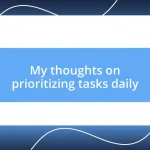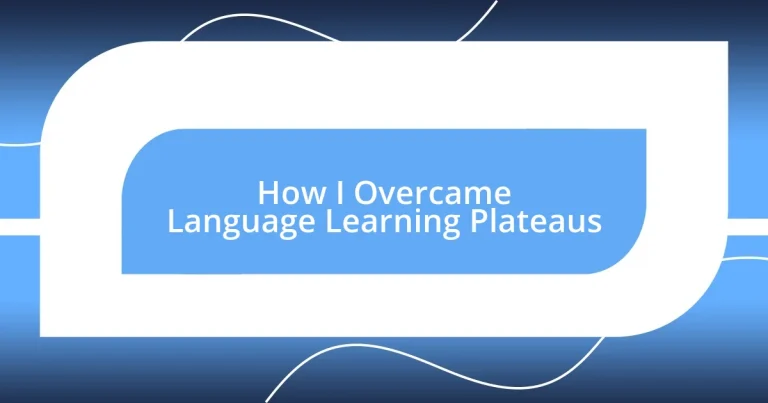Key takeaways:
- Language learning plateaus are common and serve as crucial moments for reflection and reassessment of learning methods.
- Identifying your personal learning style and incorporating diverse resources can revitalize your language study experience and enhance motivation.
- Setting clear, achievable goals and cultivating a support system are vital for maintaining motivation and overcoming challenges in language learning.

Understanding language learning plateaus
Language learning plateaus can feel frustrating, like running up a hill and suddenly hitting a flat stretch. I remember a time when I was deep into my Spanish studies. I had progressed quickly at first, but then, out of nowhere, my ability to grasp new vocabulary and grammar rules seemed to stall. It made me question my dedication and, honestly, if I was cut out for learning this language.
These plateaus often occur when you’ve mastered the basics but find yourself struggling to push past that next level. It’s almost like a bridge that feels out of reach. Have you ever felt that nagging sense of stagnation, where despite your best efforts, you’re not moving forward? I have—many times! It can be disheartening, but these moments are actually a normal part of the learning process.
What I’ve come to realize is that plateaus are not just barriers; they can serve as valuable learning checkpoints. Reflecting on my experience, I’ve learned to embrace these lulls, recognizing them as crucial moments for reflection and evaluation. Perhaps, like me, you’ve discovered that taking a step back to reassess your methods or focus on different skills can reignite your passion and progress.

Reasons for experiencing plateaus
Experiencing a plateau in language learning can stem from multiple factors. One major reason is the shift from basic to intermediate levels, where the gap between what you know and what you want to learn becomes more pronounced. I remember feeling that struggle vividly when I transitioned from remembering everyday phrases to trying to hold actual conversations; it felt like trying to catch smoke with my bare hands.
Another reason for hitting a plateau could be a lack of motivation or a change in learning routine. During one of my language phases, I found myself engrossed in grammar drills that served me well initially, but over time, they became monotonous. I realized that my enthusiasm was waning, which made it harder to absorb new information. Have you ever experienced that dip in motivation? It’s tough, but recognizing it was the first step to reviving my interest.
Lastly, external distractions play a significant role in causing plateaus. Life can get busy, and when I was juggling work and family commitments alongside my language studies, my focus was divided. Reflecting back, those moments taught me the importance of creating a learning environment that minimizes distractions, allowing me to fully immerse myself in the language.
| Reason | Description |
|---|---|
| Skill Gap | Transitioning from basic to intermediate levels can expose limitations in skills. |
| Lack of Motivation | Monotonous methods can lead to disengagement and decreased learning curiosity. |
| External Distractions | Juggling life responsibilities can hinder focused learning and retention. |
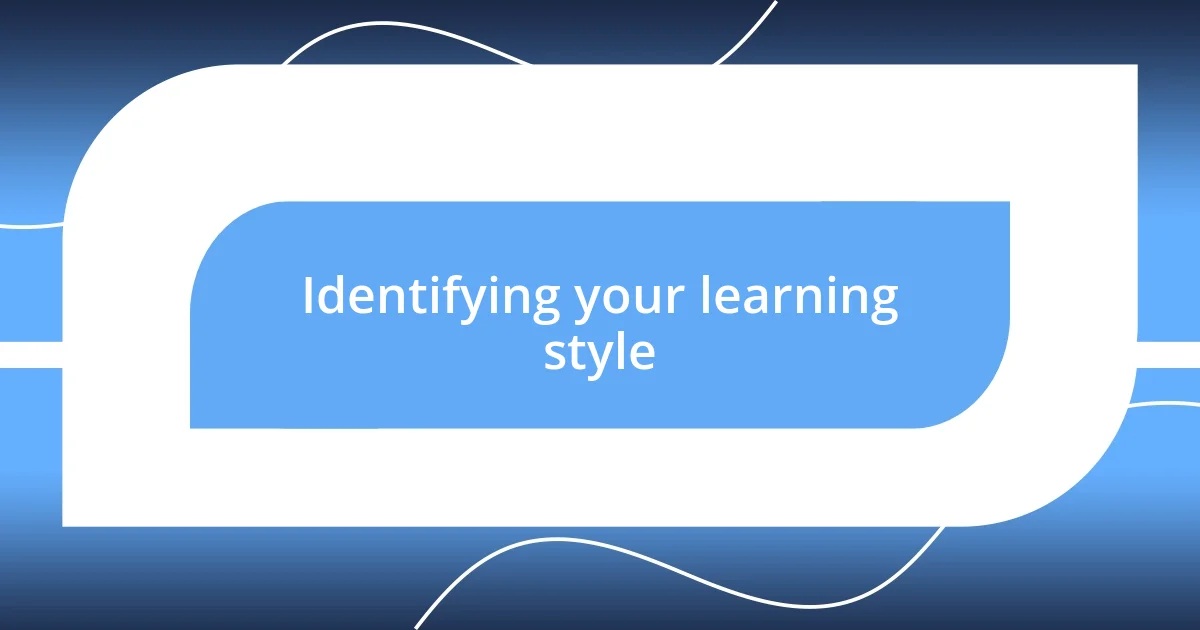
Identifying your learning style
Identifying your learning style has been a game changer for me. When I first began studying languages, I tried every method available, from flashcards to grammar apps, but nothing seemed to stick. It wasn’t until I explored my learning preferences that I started to see real progress. For instance, I discovered that I’m a visual learner—I respond best to images, charts, and videos. Recognizing this allowed me to tailor my study materials accordingly, which transformed my experience into something engaging and effective.
To figure out your unique learning style, consider the following:
- Visual Learner: Prefers charts, images, and videos. You might remember information better when you see it.
- Auditory Learner: Gains understanding through listening. You might find that podcasts or conversations with native speakers make concepts clearer.
- Kinesthetic Learner: Learns by doing. Engaging in hands-on activities, like role-playing conversations, might resonate the most.
Reflecting on my own experiences, I remember a time when I forced myself to memorize grammar rules from a book, but it felt dry and unhelpful. Once I began integrating video lessons and engaging storytelling, everything clicked. It’s this kind of personal connection to your learning style that can break through those pesky plateaus.
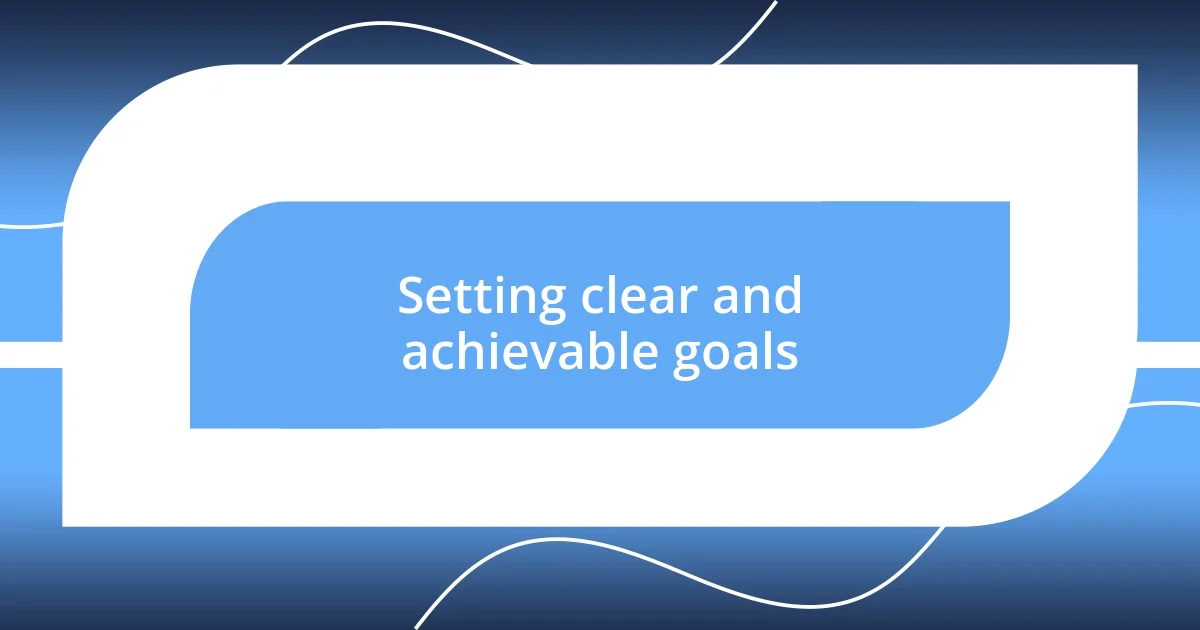
Setting clear and achievable goals
Setting clear and achievable goals is essential for overcoming language-learning plateaus. Early on in my journey, I set myself the daunting task of mastering an entire grammar book in one month. Spoiler alert: it didn’t work. Instead, I found that breaking this larger goal into smaller, digestible chunks—like focusing on five new verb conjugations a week—helped me stay motivated and actually see progress. Have you ever felt overwhelmed by a big task? It’s easy to lose sight of your objectives when you’re staring at an entire mountain.
I also learned the power of specificity. Instead of vaguely saying, “I want to improve my speaking skills,” I started aiming for tangible achievements, like “I will have a 10-minute conversation in Spanish with a native speaker each week.” This shift not only made my goals clearer but also ignited a sense of purpose in my studies. In one memorable conversation, I stumbled and fumbled through my words, but I still felt a rush of accomplishment afterward. Do you remember a moment when you pushed through a challenge? That feeling of achievement is addictive!
Lastly, I can’t stress enough the importance of regular reflection. At the end of each week, I would evaluate my progress towards the goals I set. This helped me recognize not just what I achieved, but also what I struggled with. It’s empowering to see how far you’ve come, even if the progress feels small at times. Have you ever taken a moment to look back on your own journey? Those reflections can be eye-opening and motivation-boosting, revealing the growth that’s often hidden in the hustle of language learning.
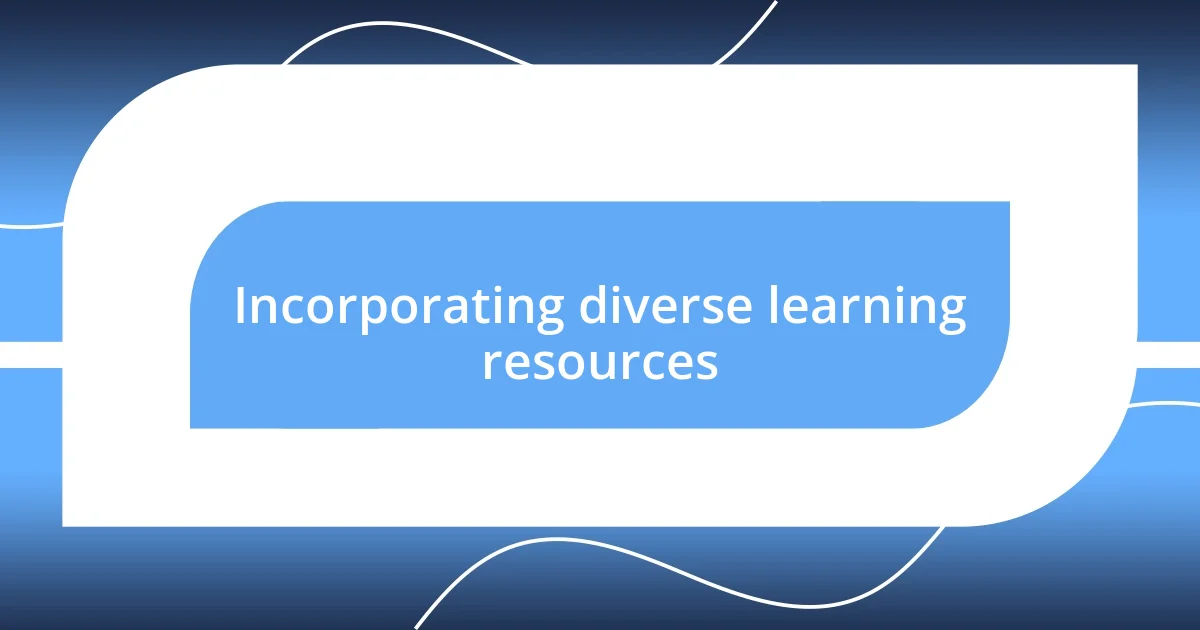
Incorporating diverse learning resources
Incorporating diverse learning resources into my study routine has been transformative. I realized that simply sticking to one method limited my progress. For example, mixing up textbooks with podcasts revitalized my learning. I could listen to native speakers while commuting, which made even dull rides feel productive. Have you ever found a resource that brought a spark to your studies? I still recall the excitement I felt when I discovered a YouTube channel that explained complex grammar topics in such a relatable manner—suddenly, it all made sense!
Another effective strategy was exploring various cultural mediums. Watching foreign films and listening to music in the target language not only enhanced my listening skills but also deepened my appreciation for the culture behind the language. I remember binge-watching a Spanish series; I started picking up on colloquial phrases and even mimicking the accents. It felt like immersion without stepping onto a plane! Engaging with the language this way made it lively and real. Have you ever connected with a culture through its art? It creates an emotional resonance that textbooks can rarely achieve.
Finally, I found that community resources can be invaluable. Engaging in language exchange meetups offered me a chance to practice speaking in a supportive environment. I vividly remember the nerves I felt before my first session. But once I started conversing, the energy was infectious. Sharing language tips with others who were equally passionate rekindled my motivation. Have you tapped into a community of learners before? It’s amazing how sharing experiences can create a network of encouragement that helps everyone break through those plateaus together.
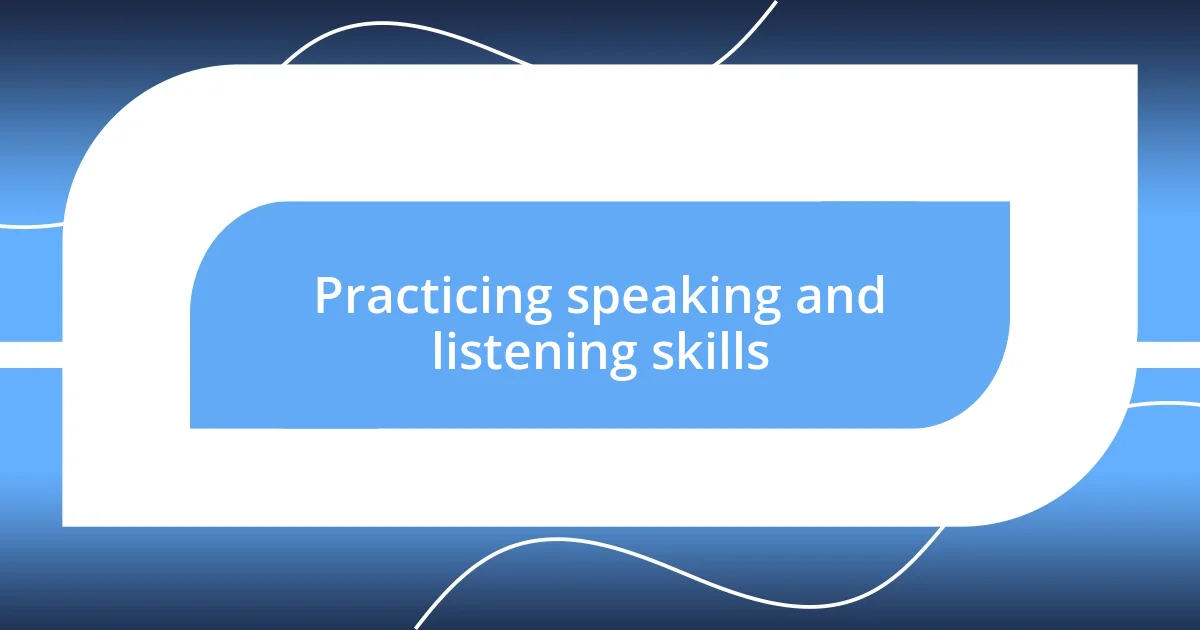
Practicing speaking and listening skills
Practicing speaking and listening skills has been a game-changer for me. I used to practice vocabulary in isolation, but nothing prepared me for real conversations. One day, I joined a local language exchange event, and despite my initial hesitation, I found myself chatting with a native speaker. It was nerve-wracking, yet exhilarating! Ever had that moment when you step out of your comfort zone? For me, it was a vivid realization that I could use my language skills in practical scenarios.
Listening is just as crucial as speaking. I started incorporating listening practices into my daily routine, such as tuning into language-specific podcasts. I remember one morning, while jogging, I caught a native speaker’s nuanced emotion in their voice that transformed my understanding of pronunciation. Have you ever noticed how emotions can breathe life into a language? That experience inspired me to focus on intonation, which made me a better communicator.
Engaging with the language through real-world contexts has had a profound impact on my learning. I vividly recall a moment when I was at a coffee shop in a foreign country, attempting to order in the local language. My heart raced as I struggled but managed to convey my request. The barista’s smile signaled that I had been understood. That joy! Have you felt the thrill of successfully navigating a conversation? Each small victory has fueled my motivation, reinforcing the idea that practice truly makes progress.
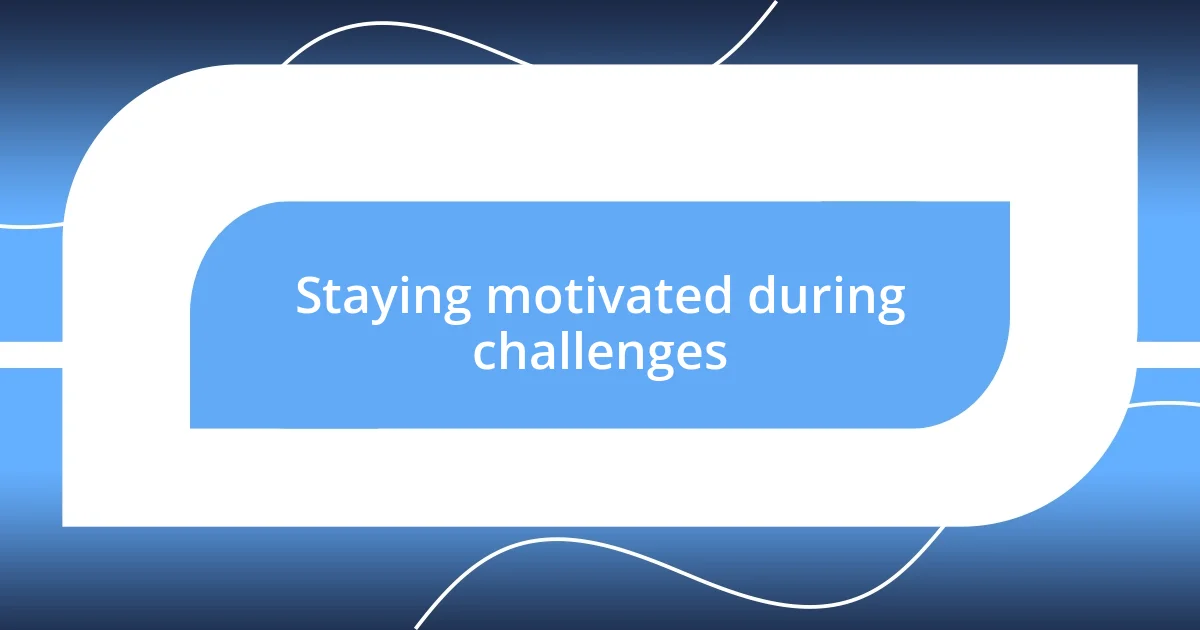
Staying motivated during challenges
Staying motivated during challenges is about finding your personal ‘why’ behind language learning. I remember a time when I hit a wall; suddenly, the words felt foreign again. It was in that moment of frustration that I stumbled upon an old journal where I’d written about my passion for travel. It sparked a fire within me to push through those tough spots. Have you ever rediscovered your motivation by revisiting your goals? I found that reconnecting with my purpose turned my challenges into stepping stones rather than stumbling blocks.
Another approach that kept my spirits high was setting small, achievable milestones. I aimed for simple goals, like mastering a new verb tense each week, rather than overwhelming myself with the entire grammar spectrum. There was a particular Saturday morning when I nailed a tricky conjugation, and that moment of clarity felt like catching lightning in a bottle! Who doesn’t crave those little victories? Celebrating those wins—however minor—can amplify motivation during periods of stagnation.
Lastly, I learned the value of leaning on a support system. During those rough patches, I began participating in online forums where language learners shared their struggles and triumphs. Hearing others express similar frustrations was comforting. One evening, a fellow learner posted about their experience of finally grasping an idiomatic expression. Their enthusiasm was contagious! Have you ever felt uplifted by someone else’s success? It reminded me that we’re all on this journey together, which made me feel less isolated in my challenges and more inspired to keep going.








